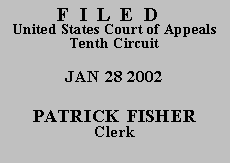

Defendant Mike King seeks a certificate of appealability to appeal the denial of his 28 U.S.C. § 2255 motion to vacate, set aside, or correct his sentence. Because he has failed to make a "substantial showing of the denial of a constitutional right" as required by 28 U.S.C. § 2253(c)(2), we deny a certificate of appealability and dismiss the appeal.
King pled guilty to one count of distribution and possession of crack cocaine with intent to distribute, in violation of 21 U.S.C. § 841(a) and § 841(b)(1)(A)(iii), and was sentenced to 292 months' imprisonment. It is uncontroverted that, because King's offense involved crack cocaine, his sentence was significantly higher than it would have been if the offense involved cocaine powder or a non-crack form of cocaine base. See U.S.S.G. § 2D1.1(c) & Note D (1998); United States v. Kissick, 69 F.3d 1048, 1052 (10th Cir. 1995) (discussing the 1993 amendment to § 2D1.1(c) that clarified the meaning of the term "cocaine base"). Following this court's affirmance of his sentence on direct appeal, United States v. King, No. 96-1040, 1996 WL 470321 (10th Cir. Aug. 20, 1996), King filed a § 2255 motion to vacate, set aside, or correct his sentence. In support of his motion, King argued that his trial counsel was ineffective for failing to object to the enhanced sentence or to require the government to prove that the controlled substance involved in the offense was "crack cocaine." The district court rejected King's motion, concluding "that the substance used in calculating defendant's base offense level was crack cocaine, that counsel was not ineffective for not arguing otherwise, and that defendant has not demonstrated the prejudice necessary to prevail" on his ineffective assistance claim. App. at 27.
To obtain relief on his § 2255 motion on the basis of ineffective assistance of counsel, King must show a constitutionally deficient performance by his counsel and that prejudice resulted therefrom. Strickland v. Washington, 466 U.S. 668, 687 (1984). King contends there was nothing in the record demonstrating that the substance for which he was sentenced was crack cocaine. Thus, King argues, his counsel "knew or should have known that the failure of the government to meet its burden under the guideline definition of 'crack' warranted a guideline sentence for powder cocaine." Aplt. Br. at 10.
After reviewing the record on appeal, we agree with the district court that King has failed to establish deficient performance or prejudice. During his change-of-plea hearing, King was asked by the district court to describe the conduct that formed the basis of his plea. King responded, under oath, that he "had packages sent through mail to" a friend's house, that he "flew there the day before . . . and . . . received the package, signed for it, and on that day . . . [was] arrested." App. at 53. When asked by the district court what the package contained, King responded, again under oath, that it contained "506 grams" of "[c]rack cocaine." Id. at 54. King's admissions thus "relieve[d] the government of any burden it had at sentencing to show that the drug involved was crack" cocaine, and King's attorney was not ineffective for failing to put the government to its burden. United States v. Gray, 182 F.3d 762, 768 (10th Cir. 1999) (rejecting similar ineffective assistance claim).
King's request for a certificate of appealability is DENIED and the appeal is DISMISSED. The mandate shall issue forthwith.
Entered for the Court
Mary Beck Briscoe
Circuit Judge
*.This order and judgment is not binding precedent, except under the doctrines of law of the case, res judicata, and collateral estoppel. The court generally disfavors the citation of orders and judgments; nevertheless, an order and judgment may be cited under the terms and conditions of 10th Cir. R. 36.3.